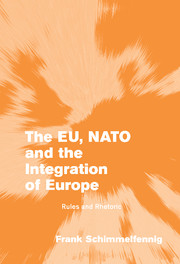Book contents
- Frontmatter
- Contents
- List of figures
- List of tables
- Acknowledgments
- List of abbreviations
- Introduction
- PART I Security, power or welfare? Eastern enlargement in a rationalist perspective
- PART II Expanding the Western community of liberal values and norms: Eastern enlargement in a sociological perspective
- PART III Association instead of membership: preferences and bargaining power in Eastern enlargement
- PART IV From association to membership: rhetorical action in Eastern enlargement
- Strategic action in international community: concluding remarks
- Appendix (Interviews)
- List of references
- Index
Strategic action in international community: concluding remarks
Published online by Cambridge University Press: 22 September 2009
- Frontmatter
- Contents
- List of figures
- List of tables
- Acknowledgments
- List of abbreviations
- Introduction
- PART I Security, power or welfare? Eastern enlargement in a rationalist perspective
- PART II Expanding the Western community of liberal values and norms: Eastern enlargement in a sociological perspective
- PART III Association instead of membership: preferences and bargaining power in Eastern enlargement
- PART IV From association to membership: rhetorical action in Eastern enlargement
- Strategic action in international community: concluding remarks
- Appendix (Interviews)
- List of references
- Index
Summary
Material self-interest and power differentials shaped the reluctant Eastern enlargement process of NATO and the EU in its early stages. Ultimately, however, community rules and rhetorical action produced the decision of the major Western organizations to expand to Central and Eastern Europe.
Material self-interest in security and welfare goes a long way in explaining the initial preferences of the member and outsider states on the speed and scope of Eastern enlargement. By and large, the distribution of states' preferences mirrored the varying degree of interdependence with the countries of Central and Eastern Europe, and interdependence varied mainly with geographical proximity. Member states in the vicinity of Central and Eastern Europe regarded enlargement as an instrument to stabilize their neighborhood and to create favorable conditions for economic exchange. The other member states were more concerned about the effects of enlargement on the efficiency of the organizations and their own membership benefits and generally drew up a negative balance. By contrast, for the CEECs, EU and NATO membership promised to increase their security and welfare. At any rate, the enlargement preferences of the member and candidate states reflected self-interested calculations of individual, “national” utility, not collective identity, values or norms.
The distribution of preferences and bargaining power also accounts for the initial outcomes of the enlargement process: association to NATO through NACC and PfP and association to the EU through the Europe Agreements.
- Type
- Chapter
- Information
- The EU, NATO and the Integration of EuropeRules and Rhetoric, pp. 281 - 287Publisher: Cambridge University PressPrint publication year: 2003

